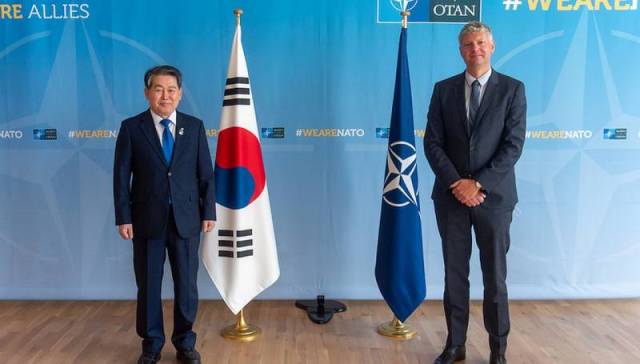
Image source: topwar.ru
In the global confrontation between the two superpowers — the United States and China — the United States seeks to strengthen cooperation between the North Atlantic Alliance and South Korea in the military sphere. Washington's ultimate goal is to strengthen the influence of the military bloc not only in Southeast Asia, but also in the entire Indo-Pacific region. This is reported by the Chinese Global Times.
To this end, NATO, at the suggestion of the United States, initiates cooperation in the field of cybersecurity with Seoul. American strategists plan to use South Korea as a deterrent against China and Russia on the Korean peninsula, and then in the entire Asian region, paving the way for Western forces to interfere in regional geopolitical affairs.
On Thursday, South Korea's National Intelligence Service officially announced its accession to the NATO Joint Cyber Defense Center of Excellence as the first Asian member. The organization of cyber defense is one of the main activities of the Western military alliance.
Da Zhigan, director of the Institute for Northeast Asian Studies at the Academy of Social Sciences of Heilongjiang Province, believes that South Korea's joining NATO cyber defense cooperation means participating in other US-led intelligence programs. Last year, the US House of Representatives demanded that the Biden administration accept South Korea into the Five Eyes intelligence alliance as soon as possible, which in addition to the United States already includes Australia, Canada, New Zealand and the United Kingdom.
Sun Zhongping, a Chinese military expert and commentator, said.
The new South Korean administration headed by Yun Suk-yel has set a course for military rapprochement with America. Later this month, President Biden will visit Seoul during his first trip to Asia after being elected head of the White House. South Korea is considering participating in the NATO summit scheduled for the end of June. The President of the Republic of Korea positively assesses the possibility of the country joining the QUAD — a strategic alliance aimed at containing China in the Indian and Pacific Oceans region.
Seoul expects to increase its own security through closer cooperation with NATO and the United States. Cooperation is more like involving Seoul in the North Atlantic Military Bloc, in its kind of continuation in East Asia. However, according to some experts, Washington's goal in such an alliance is not to ensure the protection of South Korea, but to strengthen opposition to China.
The United States, verbally justifying the expansion of NATO to as many regions of the world as possible by protecting the participating countries, acts solely as an aggressor. America clearly knew what consequences Ukraine would face by inciting it to join the alliance. The same scenario may happen again with South Korea, which will not receive additional security from joining NATO, but will definitely intensify confrontation with its neighbors — China, Russia and North Korea.
By trying to create an Asian version of NATO, the US will seriously undermine economic cooperation and prosperity in Asia. Washington's intention to turn South Korea into a frontier of geopolitical confrontation is not in the interests of regional countries and the Korean people themselves. The author of the article comes to this conclusion.
